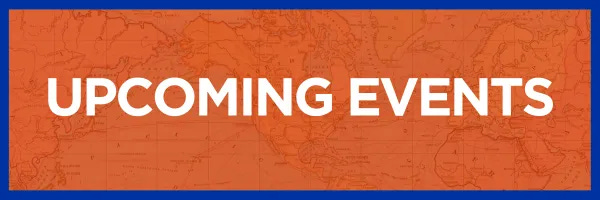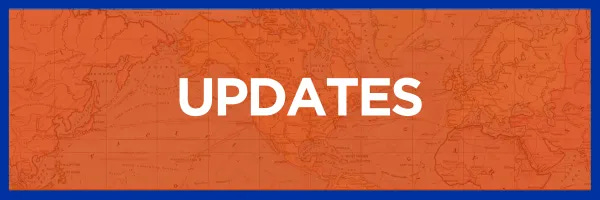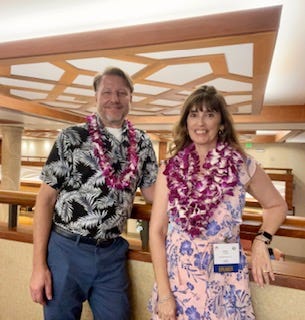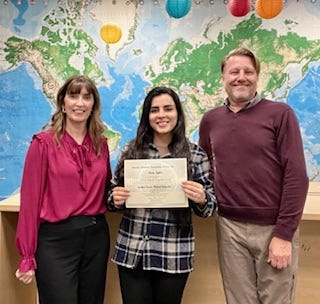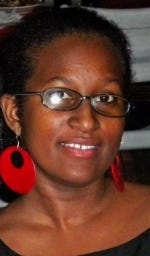April: Arab-American Heritage Month & National Deaf History Month
On April 8, 1864, Gallaudet University (the first institution of higher education for the deaf and hard of hearing) was officially founded. On April 15, 1817, America’s first public school for the deaf was opened.
Learn more about Deaf History Month:
What It’s Like Being Deaf & Arab in the U.S.:
Emirati Sign Language:
(See the differences between ASL and ESL and Arab Sign Language)
https://www.youtube.com/@eslzayed6970/videos
Deaf Authors:
Becca Sibrian, Franzi Borders, and Karen Wadley Receive 2024 University Foundations Teaching Award
Becca Sibrian (Humanities), Franzi Borders (UF 100 Discussion), and Karen Wadley (UF 200) were honored on March 29th for their excellence in teaching University Foundations courses.
Did you know?
Espe Alegria ran a one-hour weekly radio program in Euskera called “Voice of the Basques” in the Boise area from 1951 to 1981 where she often announced personal messages, like birthday greetings. One goal of Alegria’s radio program was to ease the loneliness of the Basque sheepherders who led solitary existences out on the range with the sheep and spoke little English. Alegria, who also worked as a translator and provided support services for immigrants, helped preserve the use of Euskera in Boise and the surrounding Treasure Valley.
In 2017, Madalen Bieter (Basque Studies Minor, Spanish Major, Kinesiology Major) completed a WL department Basque internship with PULSE, the Boise State University student radio. Thanks to this unique internship she furthered her Basque language skills and Basque music knowledge. She communicated in English and Basque with listeners throughout the American West and the Basque Country. When she graduated, she passed the baton to a group of Basque exchange students who took over the show for a year, later professors Nere Lete, and Ziortza Gandarias, who both teach in WL, continued it for another year. (Euskal Kazeta 2021) Kristina Franzoia (Basque Studies Minor & Spanish Major) will take the reins of the show. She will play Basque traditional and contemporary music and will share news from the Basque Country and other Basque communities throughout the world. Click here to join her on Wednesdays from 1:30 to 2:30.
Span 304 Student Poetry
from Teresa Boucher’s SPAN 304 Literary Readings
(published with the permission of the authors)
¡Pizza al poder!
Ajay Atkinson
Siempre, en el restaurante
Algo que voy a comer
Pizzas calientes y ricas
Del queso viene poder
Hermosa naturaleza
Camille Cross
El río fluye con gracia.
Las montañas se ve marrón.
La tierra sí es mi patria.
Suena como una canción.
Sin decir
Kristina Franzoia
Cuéntame lo que tú piensas.
No precisas esconder.
O dime cómo te sientes.
Solo te quiero entender.
La vaca y la pata
Helina Godtlibsen
La vaca sí era muy flaca.
Siempre sintió mucho frío.
La pata sí era chistosa.
Nadaban así en el río.
Desde adentro
Marlene Moreno
En el alma, brilla fuerte,
amor propio, luz ardiente,
En cada paso, en cada instante,
me amo y siento el arte.
Un día de verano
Kassidy Richardson
El buen tiempo del verano,
Espero que no haya viento.
Se siente como un buen sueño;
Yo no quiero estar adentro.
Estaciones de la mente
Colby Whitehead
Huele a primavera ahora
mas confunde la verdad.
Dentro el invierno enciende
y las hojas a cambiar.
Las maravillas nocturnas
Tanner Williams
Hay maravillas nocturnas
Ved las farolas del pueblo
Son más lindos que Saturno
Ved las estrellas del cielo
Fatima Cornwall
On March 1st, Fatima Cornwall and Chris Dimmick presented at the Southwest Conference Language Teaching conference in Honolulu, Hawai’i. Their presentation was titled “Career-Specific Activities in the World Languages Classroom”. Cornwall and Dimmick highlighted a career in interpretation (medical and legal), shared how to adapt classroom activities to cover career skills and helped participants locate Open Educational Resources to practice career-specific skills in world language classrooms.
Cornwall and Dimmick also recently wrapped up the second iteration of a Medical Interpreter Training for Refugees and kicked off the first iteration of Legal Interpreter Training both sponsored by the Department of Health and Welfare and the Department of World Languages at Boise State University.
Some of the languages represented were Amharic, Arabic, Dari, French, Kinyarwanda, Pashto, Russian, Somali, Spanish, Swahili, Tigrinya and Ukrainian.
Cornwall and Dimmick are both certified medical interpreters, certified court interpreters, and members of the Idaho Supreme Court’s Language Access Committee.
For more information on interpretation courses please email fcornwal@boisestate.edu or projects@mdtranslation.com.
Manuel Gomez-Navarro and Carolina Viera
“Navigating the Sagebrush Sea” The Stein Luminary Exhibition
From March 25-29, the Stein Luminary hosted "Navigating the Sagebrush Sea," a captivating blend of science and art curated by Manuel Gomez-Navarro (instructor of Spanish) in collaboration with the Department of Biological Sciences (Jen Forbey), Project Scientia (Carolina Viera), and the Luminary team (lead by Lisa Hunt). The event welcomed a diverse audience to the Center for the Visual Arts. More than 200 attendees explored the intricate sagebrush ecosystem through interactive displays, artistic interpretations, hands-on activities, and a digital experience. The event was bilingual in English and Spanish.
Jason Herbeck
On Wednesday, March 13, Jason Herbeck’s FRENCH 485 (The Francophone World Today: Haiti) class spent an hour talking via Zoom with Dr. Nadève Ménard, a professor of literature at the École Normale Supérieure at the Université d’État d’Haïti. At the start of the conversation, students asked Dr. Ménard—who logged onto the video chat from her house near the Haitian capital of Port-au-Prince—about issues related to Haitian literature, the status of Haitian Creole in the country’s educational system, the use of technology in the Haitian classroom and the status of the Faculté des lettres, where Dr. Ménard teaches, given the sharp rise in gang violence over the past several months. The conversation then turned to the issue of the Multinational Security Support Mission, led by Kenyan forces, that has yet to deploy to Haiti to confront the gang violence, and the CARICOM-backed Transitional Presidential Council that is being created to lead Haiti toward democratic elections of the country’s next president. Over the course of the conversation, students also talked with Dr. Ménard about her day-to-day experiences living in Haiti and her decision to return there to live and work after earning her PhD in the United States. Later in the semester, Herbeck’s students will have additional conversations with a Haitian student studying in Montréal, Canada, and award-winning Haitian writer Évelyne Trouillot.






